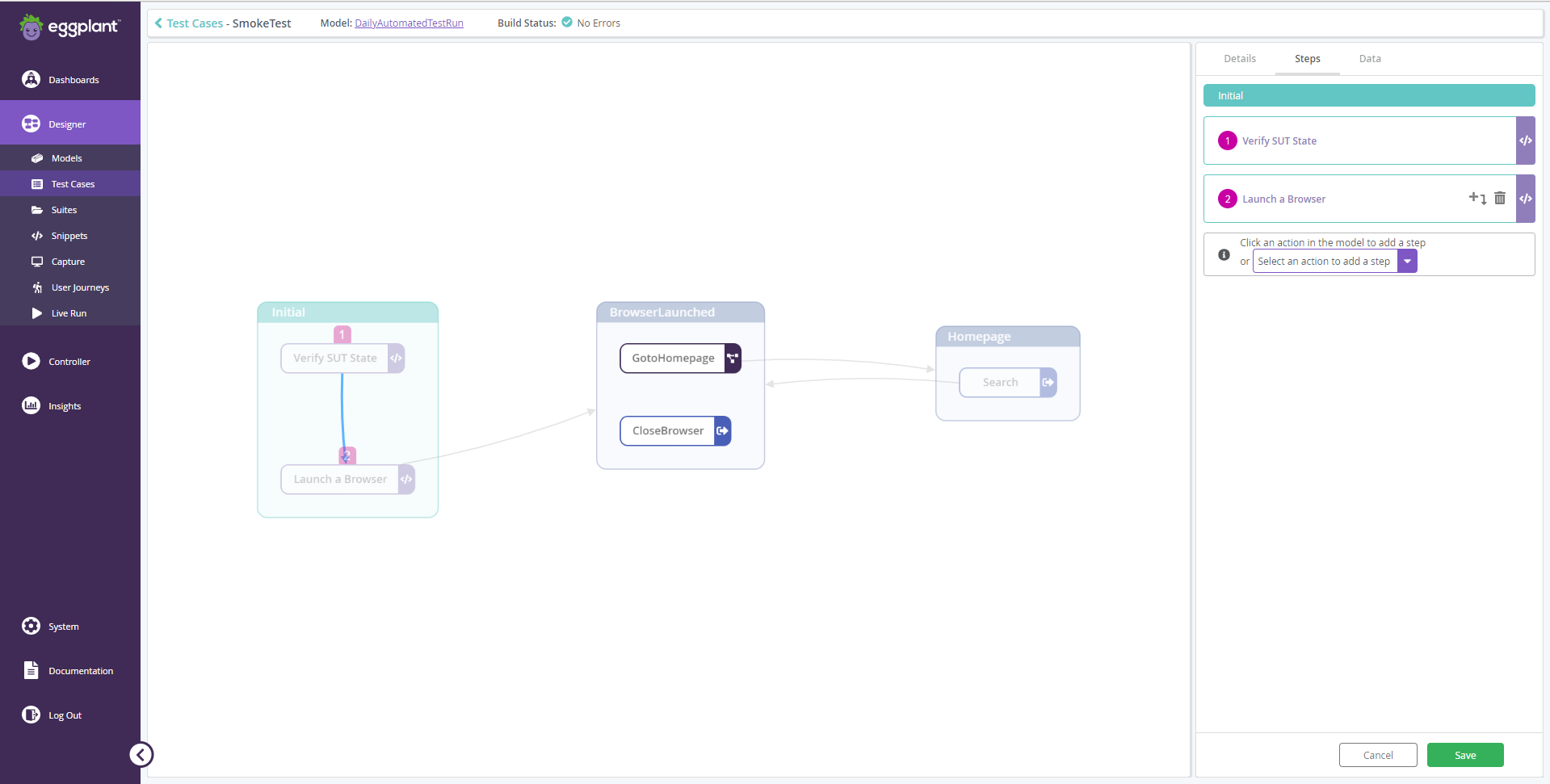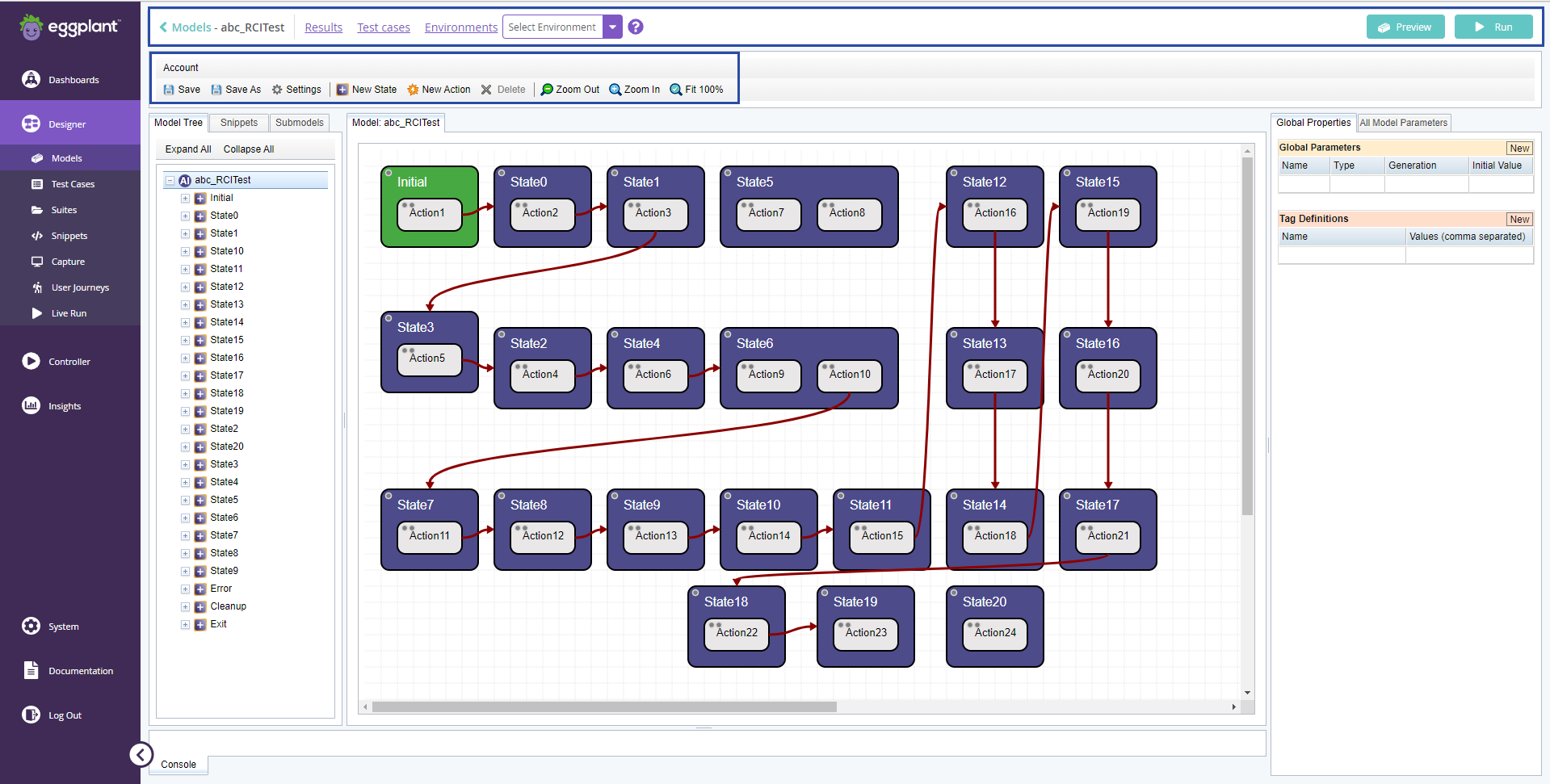リリースノート
以下の注記では、Eggplant DAI の各リリースで導入された新機能と変更点について説明します。以前のバージョンからアップグレードするときは、関連する変更点について必ずお読みください。
潜在的な互換性の問題が強調表示されます。
この製品とともに配布されるオープン ソース ソフトウェアのソース コードのコピーを受け取る権利がある場合、無料のコピーが提供されます。ご要望があれば、問い合わせしてください。
システム要件
サポートされているオペレーティング システムとシステムの推奨事項については、Prerequisites ページをご覧ください。
アップグレードする前に、すべての DAI サーバーとサービスを停止し、データベース フォルダー (data と minio) と構成ファイル (config.yml) のバックアップを作成してからインストールを開始してください。アップグレードで問題が発生した場合は、この時点まで復元する必要があります。アップグレード前にデータベースをテストする際に質問がある場合やサポートが必要な場合は、テクニカル サクセス マネージャーまたは カスタマー サポート にお問い合わせください。
- Eggplant DAI 7.4 は最新のメジャーリリースです。
- 7.4 へのアップグレードを開始する前に、Eggplant DAI 7.3 にアップグレードする必要があります。
- アップグレードが完了するまでに 10 ~ 20 分かかる場合があります。
- Eggplant DAI 7.4 は Eggplant Functional 23.4.x とのみ互換性があります。Eggplant DAI 7.4 にアップグレードする場合は、Eggplant Functional のバージョンも更新する必要があります。
リリース 7.4 (2024 年 8 月)
このバージョンの DAI には、次の機能強化、不具合修正��、CVE 修正が含まれています。
テスト構成の実行を再試行する
DAI は、SUT や実行環境などの必要なリソースが利用できないために以前のバージョンではエラーで終了していたテスト構成を再試行できるようになりました。テスト構成の実行開始時に、DAI は必要なリソースが利用可能かどうかを確認できます。リソースがロックされている場合、実行ステータスは Pending に設定され、テスト構成コンソール ログに実行をブロックしているリソース制約が報告されます。再試行は、DAI システム管理者がサーバー構成で指定した一定の間隔で、一定期間実行できます。この機能強化により、スケジュールの衝突やライセンスまたはリソースの競合を気にすることなく、ステップレベルの再テストと失敗時の停止を最大限に活用できます。これらの構成オプションの詳細については、Retry Settings for SUT and Execution Environment Connections を参照してください。
強化されたテストケースパラメータ化(Model-based)
テスト ケースのステップ レベルで利用可能なパラメータのいずれかに対し�てカスタム値を設定することで、テスト ケース レベルで既存のモデル パラメータ値をオーバーライドできるようになりました。ライブ ランでは、実行時にパラメータ値を設定することもサポートされるようになったため、特定の値を適用した場合の効果をインタラクティブに確認できます。詳細については、ライブ ラン ページの Set Parameters を参照してください。さらに、ランナーによって実行されるテストのテスト構成レベルで同じパラメータ値をオーバーライドすることもできます。この新しい機能により、テスト ケースとテスト構成を複製して異なるアプリケーション動作を実行する必要がなくなり、メンテナンスのオーバーヘッドが削減されます。テスト アセットの 1 セットを使用するように統合し、必要に応じて異なるパラメータ値を変更することで、目的の動作を実行できるようになりました。Configure Custom Parameters for Steps Added を参照してください。
DAI 7.4 のパラメータ化強化は、モデルベースのテスト用です。スクリプトベースのテストケースのパラメータ化は DAI 7.2 から利用可能でしたが、次のリリース 7.5 ではスクリプトベースのテスト構成に拡張されます。DAI 7.5 では、Eggplant Runner/Azure DevOps/GitHub/Jenkins 統合を介して、両方のモードに完全な CI/CD 統合も提供されます。これらの将来の機能強化は、動的環境やテスト実行の SUT 割り当てなど、さまざまなシナリオで役立ちます。
Windows 単一システム接続タイプのサポート (Development/Live Run)
DAI で Windows デスクトップ用の Eggplant Functional Single System 接続タイプを活用できるようになりました。この接続タイプの DAI サポートは、主にライブ実行によるテスト アセット開発プロセスを簡素化するように設計されています。Single System 接続タイプは、モデルベースとスクリプトベースの両方の実行で使用できます。ライブ実行をトリガーするときは、事前に構成された「ローカル」実行環境に接続された「ローカル」シングル システム SUT を選択する必要があります。シングル システム SUT 接続タイプの詳細については、Adding SUT ConnectionsおよびStep by Step: Entering Single System Connection Detailsを参照してください。
DAI 設計エージェントを使用する Live Run では、アクセスするために、選択した実行環境と同じホストに対応する事前構成済みの DAI SUT を選択する必要があります。つまり、実行環境と SUT の両方が同じホスト上にあり、SUT 構成でリンクされている必要があります。
技術的な実装上の制約により、テスト構成を実行し、DAI 実行エージェントを使用して単一システム接続で実行する場合、エージェントを Windows サービスとして起動することはできません。代わりに、アクティブなデスクトップ セッション内のコマンド ラインから実行する必要があります。
パブリック API – テスト結果のみ
DAI 7.4 には、初めて正式に公開された API が含まれています。この最初のパブ�リック API は、統合目的のみでテスト結果へのアクセスを提供します。これを使用して、テスト結果のリスト、個々のテスト ログ、およびスクリーンショットを抽出できます。詳細については、Public API Overview を参照してください。
Eggplant Runner 経由で報告されたテスト結果 ID
Eggplant Runner では、コンソール ログ出力内に個々の結果へのリンクが含まれるようになったため、サードパーティ統合の result.xml ファイルを解析する必要がなくなりました。たとえば、出力に次の例のような結果リンクが表示されるようになりました。
2024-05-14 18:59:13,318 INFO Test configuration run completed with status SUCCESS
2024-05-14 18:59:13,318 INFO Test configuration ed6c3bc4-41a4-4cfa-abd2-e8a789f0d5d9 exited with status SUCCESS
2024-05-14 18:59:13,319 INFO Results: http://localhost:8000/controller/results/runs/b8e99c6d-1424-488d-8aed-539a84f4938a
2024-05-14 18:59:13,409 INFO Total test runs: 5
2024-05-14 18:59:13,410 INFO Test run 75: http://localhost:8000/controller/results/75
2024-05-14 18:59:13,410 INFO Test run 76: http://localhost:8000/controller/results/76
2024-05-14 18:59:13,410 INFO Test run 77: http://localhost:8000/controller/results/77
2024-05-14 18:59:13,411 INFO Test run 78: http://localhost:8000/controller/results/78
2024-05-14 18:59:13,411 INFO Test run 79: http://localhost:8000/controller/results/79
RabbitMQ トラフィックの暗号化
DAI サーバーで HTTPS を有効にすると、DAI に組み込みのメッセージ ブローカー (RabbitMQ サーバー) との通信を暗号化するオプションが提供されるようになりました。具体的には、すべての RabbitMQ 通信にトランスポート層セキュリティ (TLS) を使用するように DAI を構成できます。デフォルトでは、RabbitMQ は暗号化されていない通信を引き続き使用します。すべてのトラフィックを暗号化するために証明書を使用するように RabbitMQ を構成するには、DAI 構成ファイル (config.yml) を新しい設定で変更する必要があります。これらの設定の使用方法�については、Encrypt RabbitMQ Communications を参照してください。
外部通信プロトコルのセキュリティ強化
このリリースには、HTTPS セキュリティ ヘッダーを有効にするための nginx と Python の構成更新と、クロスオリジン リソース共有 (CORS) 用の信頼されたドメインのホワイトリストの追加が含まれています。Strict-Transport-Security、Content-Security-Policy、および X-Content-Type-Options はすべて、HTTPS が構成されたインスタンスに適切な値でデフォルトで設定されます。
Windows のSilent (Unattended)インストール
DAI は、コマンドラインで「silent」な無人インストール、アップグレード、およびアンインストールを実行するオプションをサポートするようになりました。「silent」という用語は、グラフィカル ユーザー インターフェイス (GUI) を介したユーザー入力なしでインストール (またはアップグレードまたはアンインストール) するプロセスを表すために使用します。代わりに、DAI インストール プログラムが実行時に読み取る新しい silent.ini ファイルで、DAI サーバーの実行に使用する構成設定を指定できます。DAI のインスト��ールを自動化する場合、またはマシンにコマンドライン アクセスしかできない場合は、このサイレント オプションを使用できます。詳細については、Silent Install, Upgrade, and Uninstall of Eggplant DAI on Windows を参照してください。
不具合修正
-
状況によっては、変更履歴が長い大規模なモデルでテスト実行の開始が遅れる可能性がある問題を修正しました (CRD-1626)。
-
パススルー パラメータ値がサブモデルで上書きされる問題を修正しました。パラメータ値は再生成されずにメイン モデルとサブモデル間で渡されるようになり、値が保持されるようになりました。
注記この変更は既存のモデルの実行に影響する可能性があることに注意してください。
-
状況によっては、テスト ケ��ースの数が多いモデルで、テスト構成内のテスト ケースのリストを読み込むときに遅延が発生する問題を修正しました (CRD-1630)。
-
状態パラメータが定義された状態にグローバル アクションが追加されたテスト ケースが「個別のテスト ケース」として不適切に報告され、実行できない問題を修正しました。これは現在許可されています (CRD-1620)。
-
名前が 50 文字を超えるテスト スイートをアップロードしようとすると、「デシリアライズに失敗しました」という例外が発生して失敗する問題を修正しました。50 文字を超えるスイート名を DAI に正常にアップロードできるようになりました (CRD-1631)。
-
スイート内のファイル名に Unicode 文字が含まれている場合に、Design Agent が DAI サーバー上のバージョン管理されたアセット マネージャーにスイートをアップロードできない問題を修正しました (CRD-1639)。
CVE 修正
DAI 7.4 では、DAI フロントエンドまたはバックエンドで発生した脆弱性を一覧に示して、次の脆弱性を修正します。
-
CVE-2024-34064 を修正するには、Jinja を 3.1.4 にアップグレードしてください。
-
Werkzeug を 3.0.3 にアップグレードして修正: CVE-2024-34069
-
Black Duckのアドバイザリのいくつかを修正するためにKeycloakを25.0.1にアップグレードしました
-
多数の Black Duck アドバイザリに対応するため、Nginix を 1.26.1 にアップグレードしました。
-
Mingit を 2.45.2 にアップグレード
-
RabbitMQ を 3.13.3 にアップグレード
-
OpenJDK を v21 にアップグレード (Keycloak)
-
PostgreSQL 14.12-1 へのアップグレード
-
Minio の アップグレードRELEASE.2024-06-06T09-36-42
リリース 7.3 (2024 年 5 月)
DAI のこのバージョンには、次の機能強化とバグ修正が含まれています。
失敗したステップでテスト構成を停止する機能
テストステップが失敗したときに、残りのステップの実行を続行するのではなく、テスト構成 (テスト構成) の実行を停止するように DAI を構成できるようになりました。Continue running test config on step failure オプションを無効にする方法については、ステップ 3: テスト設定の詳細設定 を参照してください。
テスト結果、ログ、スクリーンショットの自動スケジュール削除
テスト結果、ログ、スクリーンショット (「テスト成果物」) をスケジュールに基づいて自動的に削除するように DAI を構成できるようになりました。テスト結果の削除をスケジュールする方法については、「スケジュールされたテストアーティファクトの削除の有効化」(./dai-windows-configuration.md#enabling-scheduled-test-artifact-deletion)を参照してください。
複数のテストケースを選択してテスト構成またはスクリプト化されたテストケースに追加する機能
テスト構成の場合、テスト ケースを検索したり、複数のテスト ケースを選択したり、すべてのテスト ケースを一度にテスト構成に追加したりできるようになりました。複数のテストケースの追加については、「ステップ2:テスト構成のステップ/Actionの設定」(./dai-test-configuration.md#step-2-configure-the-stepsactions-for-the-test-configuration)を参照してください。また、テスト構成からすべてのテストケースを一度に削除することもできます。
同様に、スクリプトベースのテストケースの場合、テストステップを検索して追加したり、スクリプトベースのテストケースからすべてのテストステップを一度に追加または削除したりできるようになりました。
テスト結果でサブモデルを非表示にする機能
明確さを向上させ、重複した結果エントリによって引き起こされる潜在的な混乱を減らすために、DAIはサブモデルのテスト結果を非表示にするオプションを提供するようになりました。
テスト結果にライブ実行またはテスト構成の結果のみを表示する機能
わかりやすくするために、Live Run または Test Config でテスト結果をフィルター処理できるようになりました。
DAI ログから秘密を隠します
セキュリティのベストプラクティスに準拠するために、DAI コンポーネント間で渡される一部の情報は、プレーンテキストのログで誤って公開されないように隠されるようになりました。
不具合の修正
- Design Agent に接続し、Designer でスニペットを編集しているときに、スニペット エディターの中央に垂直線が表示される問題を修正しました。
- モデルとタグを使用して作成されたテスト構成を削除したときに発生していた
Internal Server Errorを修正しました。 - 内部サーバーエラー
500 Composite request failedを修正し、DAI が空のサブモデル ID を持つモデルのテストケースリストを表示しなかった問題を修正しました。 - DAI Windows のインストール中に PostgresSQL データベース ディレクトリのカスタム パスを指定したために、Windows で DAI サービスを開始できなかった問題を修正しました。
- DAI のインストール中にカスタムの場所を指定した場合でも、DAI が PostgresSQL データベースのデフォルトのディレクトリの場所を使用する問題を修正しました。
- DAI がテスト構成とテスト ケース名を不整合に検証する問題を修正しました。
- モデルを作成または編集したときに発生していた
502/503 Error saving modelエラーを修正しました。 - DAI が 'Error' ステータスのテスト実行の詳細を取得できない問題を修正しました。
- DAI Controller の Test Results ページにある test cases name フィルターに、同じ名前の複数のテスト ケースが表示されない問題を修正しました。
- 探索的テストで 1 つの特定のパスのみが繰り返しテストされる問題を修正しました。注: この変更は、DAI AI エンジンの動作に微妙に影響します。その結果、以前のリリースとは異なるパスに従って生成されたテストが発生する可能性があります。
- DAI がテスト ケース結果��ログの最後のログ行からシードを削除する問題を修正しました。
- DAI が、フィルター処理からカレンダーを選択して日付範囲を選択した後、日付範囲を変更できなかった問題を修正しました。
- デザイナーでユーザージャーニーのドロップダウンリストがトリミングされる問題を修正しました。
- DAI Controller の Test Results ページで、メニューが開いているときに必要なオプションを入力して Enter キーを押すと、Run status をフィルタリングできない問題を修正しました。
- ローマ字以外のアルファベットがモデルで正しく表示されない問題を修正しました。
- スニペットで複数行のコメントが正しく表示されない問題を修正しました。
- テーブル内の Action メニュー (3 つのドットのアイコン) をクリックするとジャンプする問題を修正しました。
- 緑色のテキストが読みにくかった問題を修正しました。
- テスト構成通知のダークモードの問題を修正しました。
- 低解像度の画面で[モデル]ドロップダウンリストが正しく表示されない問題を修正しました。
- DAI Windows インストーラーの Keycloak バージョンが Keycloak タグと異なる問題を修正しました。
- CentOS上のDAIデザインエージェントがガーデン環境からSuiteをダウンロードできない問題を修正しました。
- DAI System > Agent Tools ページでドロップダウン リストが部分的に表示され、リストがスクロールできない問題を修正しました。
- DAI Run Agent を Windows サービスとして実行できない問題を修正しました。
- System > Access > Manage Users �ページと System > My Account > Account Settings ページのユーザー インターフェース (UI) の軽微な問題を修正しました。
- SUT 詳細ページの Edit ボタンが Mac Safari ブラウザで位置がずれて表示される問題を修正しました。
- Insights バグ ハンティング グラフのホバーに正しいラベルが表示されない問題を修正しました。
- 問題が修正され、テスト ケース ダッシュボードの Date range ドロップダウン リストに 'Space' キーを押したときに選択内容が保存されるようになりました。
- Controller > Runner ページの結果が、小さな画面で適切にサイズ変更されない問題を修正しました。
- クラウドベースの実行環境を使用すると、新規 SUT ページまたは SUT の編集 ページで指定された実行環境が無視される問題を修正しました。
- テスト ケースの詳細ページで、テスト ケース名がページ見出しに収まらない問題を修正しました。テスト ケースの詳細ページは、デザイナー テスト ケース ページでテスト ケースの Action メニューから View を選択したときに表示されるページであることに注意してください。
- DAI Run Agent と EPF のデフォルトのログレベルを、より詳細でないレベルに変更しました。
- テスト ケースのステップを変更して保存した後、テスト ケースのステップが不適切な順序で表示される並べ替えの問題を修正しました。
DAI 7.3 CVE 修正
DAI 7.3 では、DAI フロントエンドまたはバックエンドで発生した脆弱性を一覧に示して、次の脆弱性を修正します。
フロントエンド
- CVE-2023-45857 を修正するための axios の 1.6.8 へのアップグレード
- BDSA-2015-0687 を修正するために react-refresh を 0.14.0 にアップグレードしました
- CVE-2021-3803 を修正するための nth-check の 2.0.1 へのアップグレード
- CVE-2021-23450、CVE-2018-15494、CVE-2021-23450、CVE-2020-5259、BDSA-2020-0277、CVE-2020-5258、CVE-2018-1000665 を修正するための Dojo の 1.17.3 へのアップグレード
バックエンド
- CVE-2023-2976、CVE-2020-8908 を修正するための google-guava の 32.0.1 へのアップグレード
- CVE-2022-1471 を修正するためのブラックダックスキャンから snakeyaml を除外する
- CVE-2024-23342、GHSA-wj6h-64fc-37mp を修正するために ecdsa を除外します
- CVE-2024-0727、CVE-2024-26130、CVE-2023-38325、CVE-2023-49083、CVE-2023-50782 を修正するための pyca/cryptography の 42.0.4 へのアップグレード
- Pycryptodome の脆弱性: CVE-2023-52323、GHSA-j225-cvw7-qrx7
- Jinja2 の脆弱性: CVE-2024-22195、GHSA-h5c8-rqwp-cp95
- Starlette-0.27.0の脆弱性: GHSA-93gm-qmq6-w238
- Fastapi-0.104.1 の脆弱性: CVE-2024-24762、GHSA-qf9m-vfgh-m389
- Aiohttp-3.9.1の脆弱性: CVE-2024-23334、CVE-2024-23829、GHSA-8qpw-xqxj-h4r2、GHSA-5h86-8mv2-jq9f
リリース 7.2 (2024 年 2 月)
このバージョンのDAIには、以下の拡張機能とバグ修正が含まれています:
テスト結果ページへの重要な変更
テスト結果ページでのフィルタリング
- テスト結果には新しいフィルタリングオプションが追加されました。テスト結果 ページでは、Test case、Test configuration、Test configuration tag、Execution Environment、SUTのフィルタリングが可能です。これらのオプションは、以前のフィルターオプションであるID、モデル、Suite、ステータス、およびstateに加えて提供されています。SUT列は、テスト結果ページへの新しい追加項目です。これらの拡張機能により、より詳細なテスト結果の分析が可能になります。
テスト結果ページでの並べ替え
- 今後は、テスト結果を実行環境とSUTでソートできます。
テスト結果のエクスポート
- 今後は、テスト結果ページ からテスト結果を CSV(コンマ区切り値)ファイルとしてエクスポートできるようになります。さらに、テスト結果ページで適用したフィルタに基づいて結果をエクスポートできます。これにより、特定のニーズに基づいてテスト結果をエクスポートできるようになります。
テスト結果ページの列の名前変更
-
列名 Test config/Live run が Run mode を置き換えます。
-
列名 Test case/Exploratory run が Type を置き換えます。
列の結合
- Status & ID の列が Test Results ページで結合されました。ただし、実行ステータスとテスト結果のIDの両方で検索することができます。
モデルで EPF から DAI に複数のパラメータを渡す
今後は、複数の出力Parameter(リストおよびプロパティリストを除く)を使用して、スニペットの実行から生成されたデータをモデル内のActionにキャプチャして渡すことができます。この強化により、グローバルParameterを使用したり、Parameterを文字列として渡したりして解析する必要がなくなり、またParameterをファイルに保存する必要もありません。
Cron 構文によるテスト実行のスケジュールのサポート
今後は、Cron構文を使用してDAIでテスト構成をスケジュール実行することができます。Cron構文の詳細についてはこちらを参照してください。
Sauce Labs 接続によるトンネリングのサポート
DAIは現在、Sauce Labsデバイスおよびブラウザーの両方の接続にSauce Labsトンネルをサポートしています。これにより、プライベートなSauce Labsリソースにアクセスできるようになります。
DAI Run Agent
DAI Run Agent を Microsoft Windows サービスとしてインストールできるようになりました。これにより、ユーザーがマシンからログオフしても、ラン エージェントが引き続き実行されます。
DAI Run Agent は現在、MacOS Sonoma をサポートしています。
大規模データセット向けに最適化された新しいEggplant AI Bug Hunter
この新しいAI Bug Hunterは、DAIサーバーの構成変更によって、メモリの消費を削減し、大量のテスト結果を処理できるようになりました。
UI/UXの改善
テスト構成のセットアップフロー
テスト構成の設定プロ��セスが新しいタブで強化され、テスト構成の作成がより簡単になりました。
ドキュメントの強化
- 現在のバージョンに加えて、ドキュメントページの上部にあるバージョンセレクタを使用して、以前のバージョンのDAIドキュメントを参照できるようになりました。デフォルトでは、現在のバージョンがアクティブです。
- ドキュメントの日本語版が利用可能になりました。
バグ修正
- DAI Windowsサービスが停止されたときに、一部のDAIコンポーネントが信頼性を欠いて停止しない問題が修正され、再起動時の不安定さやアップグレードの失敗が解消されました。
- RESTART_EPF_AFTER_SECONDSParameterをゼロに設定して無効にすることができない問題が修正されました。
- DAIのインストールが誤った情報を含むメールを送信する問題が修正されました。
- 夏時間の変更後にスケジュールされたテストランが間違った時間に開始される問題が修正されました。
- Nginxログがエラーのみを記録して適切なサイズに成長する問題が修正されました。
- DAIが再起動されたときに、SUTと実行環境がロックされない問題が修正されました。
- DAIライセンスページが誤った情報を表示する問題が修正されました。
- スクリプト名にプラス(+)文字を含めることができるようにするための問題が修正されました。
セキュリティ修正
- Keycloakのアップグレードにより、次の脆弱性を修正しました: CVE-2023-6134、CVE-2022-4361、CVE-2023-0105、CVE-2023-2422、CVE-2023-258
- Pythonのアップグレードにより、次の脆弱性を修正しました: CVE-2023-4863、CVE-2023-40217
- CVE-2023-5868、CVE-2023-5870、CVE-2023-5869を解消するためのPostgreSQLデータベースサーバーのアップグレード
- CVE-2023-44487を解消するためのNginxのアップグレード
- Keycloakのアップグレードにより、以下の脆弱性を解消しました: CVE-2023-6134、CVE-2022-4361、CVE-2023-0105、CVE-2023-2422、CVE-2023-258
リリース 7.1 (2023 年 10 月)
このバージョンのDAIには、以下の拡張機能とバグ修正が含まれています:
RESTART_EPF_AFTER_SECONDS 環境変数
安定性を向上させるために、DAIは現在、テスト構成の実行において、Eggplant Functional (EPF)が再起動する前に実行される時間を指定するための環境変数を提供しています。この変数は、現在のステップが完了し��た後、次のステップに移る前に有効になります。デフォルト値は30分です。この変数設定は、DAI Run Agentを使用する実行にのみ適用されます。ライブ実行中は、EPFは再起動せずに継続して実行されます。詳細はEggplant Functional Stop and Restart Settings for Test Configuration Runsをご覧ください。
テストケースダッシュボード
DAIは現在、あなたのすべてのテストケースの結果を集約するダッシュボードを提供しています。日付範囲、モデル、Suiteで見たいデータをフィルタリングできます。この集約機能は、単一のビューでテスト努力の現状と進化を理解するのに役立ちます。
失敗したテストの自動再試行
DAIは現在、失敗したテストケースとエラーが発生したテストケースを自動的に再試行するオプションを提供しています。これにより、割り当てられたテスト時間内にテストを成功裏に完了することを保証します。この新機能には、テスト構成内のテストステップを再試行するオプション、失敗またはエラーが発生したテストを再試行する回数と、再試行間隔を指定するオプションが含まれます。
「閲覧者」(読み取り専用)ユーザーロール
DAIは現在、読み取り専用のユーザーロールを提供しています。このロールは、DAIでテスト結果を表示する必要があるが、テストアーティファクトを作成または更新する必要がないユーザー(たとえばマネージャー)向けです。
シングルサインオン(SSO)機能
DAIは現在、Microsoft Entra ID(以前は「Azure」アクティブディレクトリと呼ばれていました)を使用してユーザーアクセスを統合的に管理する企業のEggplantユーザー向けに、OpenID Connect (OIDC)またはSecurity Assertion Markup Language (SAML)プロトコルで構成されたSSO機能をサポートしています。DAIはまた、ADFSでのSAMLに対するSSO機能も提供しています。これは、OIDCでのADFSに対する既存のサポートに加えています。詳細について知りたい場合は、アカウントマネージャーに連絡して支援を受けてください。
バグ修正
- EPFが自動再起動するたびにサポートリクエストが表示される問題を修正
- Designer->Test Cases Consoleで最初の20のテストケースがスキップされる問題を修正
- ControllerおよびSUT実行環境でユーザーが入力した値が表示されない問題を修正
- Controller-> SUTsでNameとDescriptionが最小化モードで新しい接続スライダーに表示される問題を修正
- Controller-> SUTで、ラベルテキストをクリックした後もフィールドがフォーカスされない問題を修正しました
- Controller-> ResultでSearch fieldが入力中にフォーカスを失う問題を修正
- 特殊文字を含むテストケースのフィルタリングの問題を修正
- モデルインポートの'ファイルを選択'ボタンエリア外のクリック可能領域の問題を修正
- システムGit接続: 'ブランチまたはタグを選択'セクションがカード外にあり(スクロールバー付き)の問題を修正
- Run Agent: EPFログレベルがrun agentParameterセットと異なる問題を修正
- Test Case BuilderでParameterタブの無効化されたフィールドがフル幅でない問題を修正
- Test Case Detailsでツールチップがラベルの隣になく、スクロールすると見えなくなる問題を修正
- EPFメモリリークにより、頻繁なエージェント再起動が必要な問題(CRD-1424)を修正
- DAIのPgAdmin 4フォルダにあるPython.exeがv3.10のままで、v3.11に更新されていない問題(CRD-1471)を修正
- エージェントのバージョンに"/"を追加すると、Suiteのアップロードに失敗するエラー(CRD-1483)の問題を修正
- DAIで2MBを超えるモデルをインポートできない問題(CRD-1481)を修正
- テストケースで「Record」タイプのグローバルParameterに値を割り当てられない問題(CRD-1449)を修正
セキュリティアップデート
- Pythonをアップグレードして、CVE-2023-24329、CVE-2023-36632を修正
- MinIOをアップグレードして、CVE-2023-28434、BDSA-2020-2649、BDSA-2021-0784を修正
- PostgreSQLをアップグレードして、CVE-2023-39417、CVE-2023-2454、CVE-2023-2455を修正
リリース 7.0.1-1 (2023 年 8 月)
DAI のこのバージョンには、次の機能強化とバグ修正が含まれています。
Keycloak Security Update 21.1.2 – DAIには現在、クロススクリプティング(XSS)セキュリティ脆弱性を解決するKeycloakバージョン21.1.2が含まれています。
Library Upgrades for Improved Security – DAIには、セキュリティを向上させるために、Pythonおよび暗号化ライブラリのアップグレードが行われました。
Support for Reruns of the DAI 7.0 Upgrade – DAIは現在、7.0アップグレードの再実行をうまく処理できます。この修正は、アップグレード後にDAIサーバーが起動しない、またはユーザーログインを許可しない問題を解決します。
MinIO Migration Timeout Increased - MinIO移行のタイムアウトは現在3時間です。以前は、移行タイムアウトは1時間でした。
リリース 7.0 (2023 年 7 月)
MinIO デプロイメントのアップグレード
MinIOの最新の安定リリースにアップグレードが行われました。DAI 6.5からDAI 7.0への既存のインストールのアップグレードでは、主にSuiteとスクリーンショットを含むMinIOアセットの移行が行われ、これには最大1時間かかる場合があります。
エージェントの再設計
エージェントは、デザインと実行用の専用の別々のエージェントに再設計されました。デザインエージェントと実行エージェントの2種類があります。それぞれ、DAI Design AgentはDAIにSuiteをアップロードし、デザイナーでテストを実行するために、DAI Run Agentはテスト構成の実行を実行するために使用されます。両方のエージェントが必要です。
[Windowsのみ] バージョン7.0.0-0以降、古いエージェント(eggplantAIagent)がインストールされている場合は、新しいDAI Design Agentまたは新しいDAI Run Agentのインストール中に削除されます。
実行環境リスト
SUTページでは、SUTによって使用される実行環境の名前を入力する必要はもうありません。実行環境のリストから実行環境を選択できます。また、AndroidおよびiOSデバイスへの接続を除き、実行環境フィールドを空白のままにすることもできます。
SUT接続構成
接続を誤って構成することを避けるのがより簡単になりました。RDPまたはVNCが主要な接続である場合は、Webdriverのみが第二の接続として利用可能になります。逆もまた同様です。Citrix、Sauce Labs Browser、Sauce Labs Browser、Android Device、またはiOS Deviceが選択された場合、接続は1つだけになります。
テスト結果の種類による電子メール通知
テスト結果のタイプに基づいて電子メール通知を受け取ることを選択できます。パス、失敗、エラー、キャンセル。デフォルトでは、テスト構成の作成時にすべてのオプションが選択されています。
Single Sign-On (ADFS with OIDC)
DAIのシングルサインオン機能は、OIDCプロトコルを介してActive Directoryを構成するユーザーのアクセスを統一的に管理する機能を有効にします。詳細について知りたい場合は、アカウントマネージャーに連絡して支援を受けてください。
ソースコード管理統合 - GIT
GIT統合のサポートが追加されました。これにより、テスト実行はGITリポジトリからスクリプトを使用することが可能になります。SVNはサポートされていません。
AndroidおよびiOSデバイスにネイティブ接続
このオプションはSUT接続タイプリストで利用可能です。デバイスはEggplant Gatewayを介して接続します。
テスト結果ページでのフィルタリング
テスト結果ページにSuiteのフィルタリングを追加しました。
セキュリティアップデート
DAI 7.0には多数のセキュリティ強化が施されており、MinIOの最新の安定リリースが含まれています。
既知の問題
DAI 6.5からアップグレードする際、インストールを進めるために手動でプロセスを終了する必要がある場合があります。詳細については、DAI 6.5からのアップグレードをご覧ください。
リリース 6.5
テストケース結果トレンド
DAIはテストケースビューで過去10回のテスト実行の結果トレンドを提供します。これは、成功したか失敗したかのテスト実行の概観です。結果トレンドはテスト実行がどの程度パフォーマンスを発揮しているかを理解するのに役立ちます。トレンドはまた、テストが実行された時間とその期間を表示します。
Citrixのサポート
Citrix Desktop接続のネイ�ティブサポートを追加
Sauce Lab Devicesのサポート
DAIでSauce Labs BrowserとSSauce Labs Real Devices(プライベートおよびパブリック)のネイティブサポートを追加。
DAIサーバーログの自動クリーンアップ
DAIはDAIサーバーログファイルを自動的に削除するように設定できます。
リリース 6.4
メールによるテスト結果
あなたは今、テスト結果をメールで通知することができます。結果はテストが成功したかどうかを示します。メール通知により、迅速に行動を取ることができ、DAIに常時ログインしてテスト設定のステータスを確認する必要がなくなります。
テストランのスケジューリングに対するカレンダービュー
新しいカレンダーは、テスト設定スケジュールの完全な可視性を提供します。新しいカレンダーは、環境とライセンスの利用可能性に基づいて実行環境を最適化するのを助けます。
スクリプトベースのテストケース
スクリプトの順序でテストケースがこのリリースで利用可能になりました。モデルベースのテストと同様に、スクリプトでテストケースを素早く簡単に作成することができます。
テスト設定内から参照されていたすべてのスクリプトベースのステップはテストケースに移行され、これらは元のテスト設定内に自動的に含まれま��す。新しいスクリプトベースのテストもテストケース内に作成できます。テスト設定はあなたのスクリプトベースのテストケースを保持します。
上記の変更は、モデルの作成とモデルのテスト設定とDAIの整合性を保つためです。
スクリプトテストケースの移行されたテスト結果は、関連するSuite名とテスト構成(タイプ)とともにテスト結果で表示されます。しかし、Suite名とタイプはそれぞれのSuiteとテスト設定へのリンクが欠けています。必要に応じて、関連するSuiteまたはテスト設定に手動で移動する必要があります。
さらに、テスト結果ログでは、実行されたスクリプトの名前は利用できません。これは、テスト結果がテストステップに関連付けられていないためです。ただし、これらのテストケースが再度実行されると、新しいテスト結果にテストステップの詳細が表示されます。
スイート内容の可視性
DAIに保存されているSuite(ファイル、画像、リソース)の内容を表示することができます。また、バージョンや最終更新時刻などのSuiteの詳細もあります。この情報を用いて、正しいSuiteバージョンを使用しているか簡単に判断することができます。
SMTP設定
SMTP設定は、DAI内で設定可能となりました。
セキュリティ
Python(v3.9.13)、Keycloak(v19.0.3)、そしてPostgreSQL、Nginx、RabbitMQ、MinIOの最新安定リリースへのアップグレードを含む、多くのセキュリティ更新が行われました。
DAIの以前のバージョンは、事前に設定されたサードパーティクライアントclient:dai:agent:integrationを搭載して出荷されていました。これは現在、セキュリティを強化するために削除されています。必要に応じて、ユーザーは自分自身のサードパーティクライアントを作成することができます。
リリース6.3
テストケースの編集機能
既存のテストケースを編集することができるようになりました。テストケースの任意の位置にテストケースステップを追加または削除することができます。
テスト結果ページに環境詳細が表示される
テストが実行された実行環境がテスト結果ページに表示されるようになりました。環境に問題がある場合、環境の詳細を簡単に特定し、トラブルシューティングを行いやすくすることができます。
テストランのキャンセル
ライブテストランは、より簡単にキャンセルすることができるようになりました。テスト結果ページに移動し、進行中のテストランを見つけ、ボタンをクリックしてキャンセルすることができます。
テスト構成の複製
テスト設定の複製が可能になりました。これにより、新しいテスト設定を迅速に作成することができます。
グループ移行
DAIバージョン6.3までは、ユーザー名と同じ名前のアクセスグループが、各ユーザーに自動的に作成されていました。現在では、モデルへのアクセスを直接ユーザーと共有することを可能にし、これらのユーザーに合わせたアクセスグループはもう作成しません。この設計決定を考慮に入れて、6.3のアップグレードプロセス中には、
- モデルに関連付けられていないグループは削除されます。
- 元のユーザーのみがメンバーである真のユーザーに対応したグループは削除されます。
- 削除された真のユーザーに対応したグループの権限は、それぞれのユーザーに再割り当てされます。
さらに、次の点に注意してください:
- ユーザーに合わせたグループの名前が変更されている場合、そのグループはシステム内にそのまま残ります。
- ユーザーに合わせたグループに複数のユーザーがいる場合、その名前に
group_を付け加えます。 - もともとのユーザーがグループまたはシステムに存在しないが、グループが存在し、それにモデルが関連付けられている場合、グループは変わらずに残ります。
リリース6.2.1 (2022年7月28日)
テスト結果のCI/CDパイプラインへの返却
DAIのCI/CD統合は、ビルドパイプラインの一部としてトリガーされたテストの結果を返すことができるようになりました。これにより、選択したビルドプラットフォームのUIから直接これらの結果を表示することができます。
ダウンロードページを訪れて アップグレードを開始してください。
リリース6.2(2022年7月7日)
テスト構成にパラメーターをサポート
スケジュールされたテスト構成にParameterーを渡すことができるようになり、さまざまなテスト組み合わせのためのテスト構成を再利用できるようになりました。
テスト結果の日付フィルター
テスト結果は�、現在、日付でフィルタリングできます。日付フィルターを使用すると、特定の日付から、特定の日付まで、または日付範囲内のテスト結果を表示できます。これにより、テスト結果のレビューが容易になります。
モデルプレビュー
モデルプレビューはさらに強化され、プレビュー中のモデルについてのより多くの情報を提供します。これにより、プレビューしているモデルを理解するのが容易かつ迅速になります。
テスト構成実行ログ
テスト構成ステップ実行ログが利用可能になりました。これにより、テスト実行中の各ステップの詳細を確認でき、テストランが失敗した場合のトラブルシューティングが容易になります。
Windowsインストーラーログ
Windowsインストーラーは、インストールを確認するために、DAI Windowsサービスの初回起動シーケンスを実行します。インストール状況のログはインストーラーウィンドウにストリーミングされます。完了時には、ログを含むサマリーレポートが表示され、DAIのインストールと起動が成功したかど��うかを示します。
単一のテスト構成からすべての結果を削除する
1 回のクリックで、1 回のテスト構成実行に対応するすべてのテスト結果を削除できるようになりました。スクリーンショットを含むすべての関連アーティファクトが削除されます。これにより、無関係または古くなったテスト結果をすばやく削除できます。
実行環境
モデルへのアクセスに制約がないstateで、実行環境へのアクセスが簡略化されました。
SUTパスワードの可視性
SUTパスワードはもはや表示されず、機密性とセキュリティを確保します。
サイドメニューとサブメニュー
サブメニューの項目は、以前のように自動的にではなく、ユーザーの入力に基づいて展開および折りたたまれます。これにより、メニューオプションをより簡�単にナビゲートすることができます。
APIアクセスのためのサードパーティクライアント管理
APIアクセスの作成、Accessキーのダウンロード、再生成、APIアクセスの削除がより簡単になりました。ここで方法を見る
テストケース作成をガイドする RCI ユーザージャーニービュー
ユーザージャーニーの詳細を表示できます。
リリース 6.1 (2022 年 4 月 25 日)
ユーザビリティ
改良されたテストケース
テストケースの作成、デバッグ、実行がより簡単になり、結果がすぐに表示されるようになりました:
- モデルから直接テストケースを作成します。含めたいモデルの部分をクリックするだけです。組み込みの検証機能が不足しているデータまたは不正確なデータを更新するのに役立ちます。

- デバッグモードでモデルに対してテストケースを実行して、残された問題をすばやく見つけて解決します。
- 各テストケースの合格および失敗の結果を単一の画面から表示して分析します。
Designer > Test Casesに移動し、Add New+ をクリックして、新しいテストケースビルダーを使用を開始します。時間を節約するために、既存のテストケースを複製して編集することもできます。
テストケースの移行
テストケースの改善を可能にするために、既存の全てのテストケースが新しいデータベーススキーマに移行され、DAI 6.1へのアップグレードの一部として検証されます。移行中、以下の文字は全てのテストケース名でアンダースコア(_)に置き換えられます:" \ ; : { }。
一部のケースでは、テストケースが検証に失敗し、その場合は起動しません。これらのテストケースを引き続き使用するには、Test Case Builderで開き、画面上のテキストに従ってエラーを解決します。
テスト結果の改善
テスト結果ビューから直接リンクされたテストケースに移動できるようになりました。同じビューから、必要ないテストケースをすぐに削除することもできます。
共通ナビゲーション
Eggplant DAIのナビゲーションは、アプリケーションの各ページで利用可能となり、タスク間の切り替えを可能な限り容易にします。
モデル編集の簡素化
モデルワークスペースのツールバーが使用しやすさを考慮して簡素化され、トップメニューが作業中のモデルから他のテストリソースへのショートカットを提供します。

その他の改良
- アプリケーションのバージョンは現在、System > ステータスページに表示されます。
- Real Customer Insightsからのユーザージャーニーのインポートプロセスが簡素化されました。Designer > ユーザージャーニーに移動して、探索的テストを強化するために使用されるパスの全リストを確認します。ここから、不要になった個々のジャーニーも削除できます。
- Stateとactionの_変数_は、Eggplant Functionalとの一貫性を保つために、_Parameter_に改名されました。
セキュリティ
アイデンティティおよびアクセス管理(IAM)システムのアップグレードにより、API認証のためのリフレッシュトークン方式はもはや許可されません。
効率性
Helmを使用してKubernetes上にEggplant DAIをデプロイするエンタープライズユーザーのために、各テナントごとに別々のDAIデータベースが設定できるようになり、コストを削減します。
バグ修正 と改良
- Windows 10マシンでCloudstrike ATPソフトウェアを実行しながらEggplant DAIエージェントをインストールした後、
eggplantAIagent.exeはCloudstrikeソフトウェアによりもはやアンインストールされません。 - Windowsでは、Eggplant DAI 6.0/6.0.1エージェントのバージョン番号とパブリッシャー名が正しく記入されるようになりました。
powershell.exeへのシステムパスがシステム環境変数から削除されても、Windows DAIサーバーは正しく起動します。- Eggplant DAI 6.0/6.0.1にインストールまたはアップグレードする際、SMTP Server Settings画面でSMTPサーバーのユーザーネームとパスワードが必要なくなりました。
- Windows Server 2016にEggplant DAIをインストールしようとするとエラーが発生しなくなりました。
- Eggplant DAIのWindowsインストールにおいて、モデルを削除するためのActionメニューを使用するときにエラーが発生しなくなりました。
- モデルベースのテスト設定のため、長いステップ名の隣にはドラッグと削除のアイコンが正しく表示されます。
- テスト設定の一部であるテストケースが削除された場合、テスト設定の正しいステップが削除されます。ただし、最終ステップの場合は、_無効なテスト設定_メッセージが表示されます。
- グローバルParameterとState Parameterは、削除時に構文エラーをトリガーする代わりに、正しく削除されます。
- スクリプトベースのテストのSuite内の画像コレクションが単一の画像に置き換えられた場合、テスト実行は失敗しなくなりました。
- 同��じWindowsアカウントを使用して同じWindowsマシン上で複数のエージェントが実行されている場合に、A Failed to publish to exchange with routing key fedrive…エラーが発生しなくなりました。
- Bug HuntingとQAサマリーダッシュボードの履歴チャートのテストケースのリストが、すべてのサポートされる画面解像度で正しく表示されるようになりました。
- エージェントまたはスニペットを使用せずに実行される場合、名前に中国語または日本語の文字を含むテストケースはエラーなく実行できるようになりました。
- モデルワークスペースのテストケーステーブルでテストケースの名前に空白が追加されたときにランタイムエラーが発生しなくなりました。
- プラットフォームの信頼性を向上するため、Eggplant DAIとFunctionalの間の通信が更新されました。
テスト結果の種類による電子メール通知
バグ修正と改善
- Windowsのインストールプロセスを改良し、Eggplant DAIのインストール、アンインストール、再インストールが簡単になりました。
- 管理者が初めてEggplant DAIにアクセスしようとしたときに、インストールがHTTPで設定されていても_HTTPSが必要_というエラーメッセージが表示される問題を解決�しました。
- ポート80と443を使用する設定で成功したインストール後に、管理者が_無効なredirect_uri_というエラーメッセージを受け取る問題を修正しました。
- Live Runは現在、単一の同時実行ライセンスを使用してテストを正しく実行します。
リリース6.0(2021年11月26日)
機能
セキュリティ
ユーザーとリソースの認証のための業界標準のIDおよびアクセス管理(IAM)システムを実装し、以下を含みます:
- ユーザーアカウント、資格情報、許可、パスワードの中央集権型管理
- ユーザー向けのセルフサービス型アカウント管理
- ブランド化されたログイン画面
- 統合のための新しいAPI認証方法
- 新しい認証方法を使用するEggplantアクセラレーター。
トラブルシューティィングと分析
- DesignerにLive Runを追加して、モデルを構築しながらテストを実行できるようにしました。各Live Runはテストステップとログエントリーの一連のテスト結果を生成し、トラブルシューティングを迅速化します。同じテスト結果ビューは、既存の各テスト結果でも利用可能です。
- Insightsページに対話型のカバレッジheatmapを追加しました。モデル内のstateとActionのカバレッジメトリクスを選択して表示します。
ユーザビリティ
- DAI 6.0ドキュメンテーションの新しいルック&フィールを導入しました。アプリ内部とオンラインの両方で、他のEggplant製品から別々に利用可能です。
- 実験的なダークモードテーマのサポートを追加しました。System>Statusに行ってテーマを切り替えるだけです。
バグ修正
- Eggplant Cloudおよびオンプレミスのコンテナデプロイメントは、DAI APIが利用できない場合に正しく503エラーを返すようになりました。
- Modelerで、Run Reportタブからテストを削除しても関連データがすべて削除されない問題を修正しました。
- モデルデータが前のユーザーのためにキャッシュされていたため、Model Dashboardでデータがロードされない問題を解決しました。
- ホストされたDAI環境で複数のテスト設定を実行すると�きに発生したFailed to fetch VAMリクエストエラーを解決しました。
- 複雑なモデルのリランの信頼性を向上させました。
- SSL証明書を使用して設定されたWindowsインストール後に発生した証明書エラーを修正しました。
- 複数のテストランがあるモデルの実行時間を改善しました。
- 選択した実行環境がSUTで利用できない場合、意味のあるエラーメッセージが表示されるようになりました。
- カバレッジグループ変数の変更が保存されない問題を解決します。
- Eggplant FunctionalとEggplant DAIでスニペットを含むテスト設定が実行される方法の間の不一致を解決します。
リリース5.3(2021年7月20日)
機能
- テストケースのモデルを通じた旅の視覚化を追加します。この新機能は、Eggplant DAIユーザーインターフェースのControllerメニュー内のTest Casesタブからアクセス可能です。
- Bug Huntingページには、heatmapビューが追加され、ユーザーが自分のアプリケーションの問題領域をすばやく特定できるようになりました。この機能はモデラーインターフェースから移行し、Eggplant DAI 5で導入された新しいモデリングキャンバスを利用します。
- ユーザーは、アプリ内のガ�イダンスから直接関連するドキュメンテーションにリンクできるようになりました。
- ユーザビリティの強化:
- セクション間および個々のページ間のナビゲーションは、今後はサイドバーのみで制御されます。ページの上部にあったタブは削除されました。
- モーダルを使用していたインターフェースの一部(例:SUTの詳細の編集)は、今後は完全なページに表示され、ブックマークや共有が可能になります。
バグ修正
- 非常に大きなモデルのカバレッジを計算できなかったエンジンの問題を解決します。
- 拡張ウェイトコマンドを含むスニペットの実行から生じる問題を修正します。
- 「すべてのスニペットを無効化」オプションの動作に関する問題を解決します。
- Webdriverのスニペットが、Studio GUIを最初に起動しなければ機能しなかった問題を解決します。
リリース 5.2.1 (2021 年 5 月 20 日)
バグ修正
- モデルコンソールで
Reached max request limitエラーが表示される問題を修正します。 - テストケース��の実行を中止しても次のステップがキャンセルされない問題を解決します。
- \`CompareScreenコマンドで作成された画像のダウンロードがエージェントダイアログのManage Suitesボタンを使用しているときに問題が発生するのを修正します。
リリース 5.2 (2021 年 5 月 11 日)
機能
- フルエディターに切り替えることなく個々のモデルをすばやく探索できるようにする、新しいモデルプレビューを追加します。
- Eggplant DAIのインストールとアップグレード中にHTTPS設定を自動的に設定するサポートを追加します。これにより以下の利点が得られます:
- 手動で設定ファイルを編集する必要がなくなります。
- HTTPS設定はその後のインストールとアップグレードを通じて維持されます。
- Test Resultsタブの改善は、Duration列で
hh:mm:ss時間形式をサポートします。 - Eggplant DAI UIのControllerメニュー内の**Test Cases**タブを通じて、指向テストケースを表示し削除するオプションを追加します。
- Eggplant DAI UIのStatusメニュー内に新たに**License**タブを追加します。これにより、管理者は�以下を実行できます:
- ソフトウェアライセンス契約をダウンロードし、全ユーザーを代表して受け入れる。
- ライセンスを表示し追加する。
- Cloud Execution EnvironmentからローカルSUTへの接続を有効にするオプションを提供します。
バグ修正
- DAIがWindows上でHTTPSで設定されている場合に、スクリーンショットが新しいタブで開かなかったりダウンロードできなかった問題を修正します。
- AI APIに関する問題を修正し、それが一部の環境で失敗する原因を解消します。
- 同じ名前の変数を削除する際の問題を修正します。
- テストケースに特定の変数条件に対するエラーメッセージを改善します。
- WindowsでグローバルActionがスキップされる問題を修正します。
既知の問題点
もし、スニペットの実行が遅くなり、モデルコンソールでこのエラーReached max request limitを見る場合は、適切なパッチ修正を含む製品の現在のバージョンを更新することをお勧めします。Eggplant DAIのバージョンに適したパッチ修正を取得するには、Eggplantカスタマーサポートに連絡してください。
リリース5.1(2021年2月1日)
機能
- QA Summaryという追加のダッシュボードを追加します。
- Script Execution経由でテストを実行する新しい方法を導入します。
- DesignerのModelsタブは、現在以下の追加機能を提供します:
バグ修正
- DesignerのCaptureページでモデル名を入力する際に発生するエラーを修正します。
- 大量に実行されたモデルを開く際にModeler UIを遅くする問題を解決します。
- テストケース作成のためのモデルのグル��ープを変更する際に発生したエラーを修正します。
- Run Execution APIエンドポイントを実行する際に、
modelNameとgroupParameterと共にmodelIdを必須Parameterとして入力する必要があった問題を解決します。 - Coverage Reportが最新のモデルの変更を欠いていた問題を修正します。
- 親モデルから実行したときに、サブモデル内のテストケースが誤ってラベル付けされる問題を解決します。
既知の問題点
- システム全体でユニークなモデル名を強制します。たとえば、別のグループで同じ名前のモデルがある場合、それらは
MODELNAME_UUIDに名前変更されます。 Save Model As メニューオプションを選択して、モデルを好みの一意の名前として保存することができます。 - Modeler UIを使用する代わりに、モデルの元の名前で再インポートして保存するときに軽微な問題が見つかったため、Models タブ(Designer)を使用してモデルをインポートすることをお勧めします。
リリース 5.0.0(2020年11月18日)
このリリースは、DAI Eggplant Cloudの顧客にのみ適用されます。
機能
Eggplant Cloudでエンドツーエンドのテスト実行を行う能力を追加します。 Eggplantソフトウェアを使用して、ローカルにFusion Engineをインストールしたり、ブラウザーインスタンスとしてのデスクトップマシンを設定したりせずに、Webアプリケーションに対して機能テストを実行できるようになります。
既知の問題点
Run Execution APIエンドポイントを実行するときに、modelName と group Parameterを入力するだけでなく、modelId を必須Parameterとして入力する必要があります。
リリース 4.2.3(2020年10月29日)
バグ修正
- Modelerコンソールに表示されるエラーメッセージが不正確な説明を持つ問題を修正します。
- Coverage Reportが表示されない問題を修正します。
- エンジンプロセスの割り当てが間違っていたためにDAIサーバーが起動できない問題を解決します。
- テストランがエラーに終わったときにRunnerページに有効なエラー説明が表示されるようにする問題を修正します。
- モデルにエラーstateがない場合、モデルの実行が無限ループになる問題を解決します。
- グローバル変数を追加した後にモデルを停止できない問題を修正します。
既知の問題点
- ローカルにダウンロードされていないSuite、つまり Manage Execution Environment window > Manage Suites オプションで利用できないSuiteからEggplant Functionalスニペットを編集するとエラーメッセージが表示されます。エラーを表示させないためには、必要なEggplant FunctionalSuiteをあなたのDAI Agentからダウンロードしてください。
- Google Chromeで Coverage Report と Run Report タイルにマウスをホバーすると、DAI Dashboard が完全にロードされません。
リリース 4.2.2(2020年9月11日)
バグ修正
- Eggplant DAI 4.2をEggplant DAI 4.1より古い既存のインストールにアップグレードする際の問題を修正します。
- 非管理者権限のユーザーがModelerインターフェースでテストを実行する際の問題を解決します。
- Eggplant Functionalスニペットを通じて非文字列型の値をEggplant DAIに戻す問題を解決します。
リリース 4.2(2020年8月26日)
機能
- モデル実行に関連するステップのスクリーンショットを表示およびダウンロードするための新しいScreenshotsタブを Test Results tab > View Details ペインに追加します。
- Linux OS用の新しいエージェントインストーラーを追加します:CentOS/Red HatとUbuntu/Debian。
- Eggplant DAI管理者向けの追加情報を提供する新しい Status タブをSystemページに追加します。ここから、接続されたエージェントを含むすべてのEggplant DAIコンポーネントのstateを確認できます。
改善点
- Eggplant DAI UIには、アプリ内のヘルプコンテンツが含まれています。
- Eggplant DAIライセンスは、以前にインストールされた同じシリアル番号を含むライセンスキーの有効期限を延長して更新できるようになりました。
- モデルとSuiteの実行を改善します。
- データベースのパフォーマンスが向上します。
バグ修正
- サブモデルのデータベースに失敗イベントが登録されていない問題を修正します。
- VNCとSelenium接続が失敗したテストでコンソールにSeleniumのスクリーンショットだけが表示される問題を解決します。
- 閉じたwebsocket接続から回復した後、エージェントがテストを実行しない問題を修正します。
- SSL Connectionチェックボックスがチェックされていない場合でも、エージェントがSSL証明書を読み取ろうとする問題を修正します。
既知の問題点
- 接続されたエージェントでスニペットを編集しようとするとエラーメッセージが表示されます。そのSuiteがエージェントのSuiteロケーションに存在しない場合(削除されたか、接続されたエージェントがそれを持っていないか)。
- 外部モニターが接続されたMacマシンでEggplant DAI Agentを使用すると、エージェントがクラッシュする可能性があります。回避策として、エージェントをMacで使用し、エージェントウィンドウを外部モニターに移動しないようにします。
- 以前は、モデルの反復をゼロに設定して、モデルを無限に実行することができました。この動作は、パフォーマンスとスケーラビリティの向上の一環として削除されました。
リリース 4.1(2020年5月12日)
機能
- Eggplant DAIにSuiteをアップロードし、それらをモデルと関連付けてテスト実行で使用する機能を追加します。この機能は以下の領域でもサポートが追加されます:
- Execution Environment: AIエージェントを介してSuiteのアップロードとダウンロードを行うオプションを提供します。これにより、モデルに関連付けられたスクリプトと画像アセットを管理することができます。実行環境が特定のSuiteで以前に使用されていた場合、違いだけをアップロードする必要があります。これにより実行が高速化します。
- Test Execution: モデルにSuiteが添付されている場合、テスト設定はそのSuiteへの以前のアクセスなしに実行環境で実行することができます。
- Suiteタブ: Eggplant DAIのインスタンスで利用可能なすべてのSuite(AIエージェントでSuiteをアップロードすることにより)を表示します。
- Models tab: Suiteをモデルに関連付けるか、既存のSuite関連を変更します。
- Eggplant AI APIを更新:
- モデルにSuiteを関連付けるためのエンドポイントを追加します。
- Composerエンドポイントを改善して、次のことができます:
- Eggplant DAIからアセットを削除し、AI APIから関連するモデルアセットを削除します。
- モデルと関連するSuiteを取得します。
- RunとAbortエンドポイントでは、以下のことが可能になります:
- エージェントでSuiteのダウンロードをキャンセルします。
- アセットをダウンロードする際に、アセットバージョンを指定します。
UIの改善
- Eggplant DAI UIは、SUT接続が失敗した場合にエラーを報告します。
- ダッシュボード内のテスト結果へのリンクは、モデルによってフィルタリングされるようになりました。
バグ修正
- テストケースの実行開��始に遅延が発生するパフォーマンス問題を修正します。
- 失敗したステータスの一部のテスト設定が合格したと報告される問題を修正します。
- モデルの選択が変更された後、テスト設定で以前のテストケースがクリアされない問題を修正します。
- *デバッグモードでエージェントコマンドウィンドウが表示される問題を修正します。
- SUT接続がテストケースステップを失敗させる問題を解決します。
- 大量の予定されたテスト設定のエラーハンドリングを改善します。
- 「進行中」のstateで実行中でないテストを示すエージェントの問題を修正します。
- Runモードに設定されているにもかかわらず、エージェントがテスト設定を実行しない問題を解決します。
既知の問題点
- Eggplant DAIにアップグレードした後、以下のことをお勧めします:
- Eggplant DAIのインストール後、ブラウザでそれを起動する前にしばらく待つことで、データベースとサービスが稼働していることを確認します。
- ブラウザでハードリフレッシュを行います。
- Eggplant DAI GUIが多数のテストを実行環境(例えば、Eggplant DAI > Runner tabのスケジュールされた実行)で行っている場合、Runモードを使用するときにエージェントからEggplant Functional GUIチェックボックスを有効にしないでください。SUT接続の連続した開閉はEggplant Functionalで問題��を引き起こす可能性があります。
- Helper SuiteなしでSuiteがアップロードされ、後でHelper Suiteを参照するように変更された場合、Suiteをアップロードする際に以下の順序を守る必要があります:
- Helper Suiteに依存しているメインSuiteを削除します。
- Helper Suiteを追加し、メインSuiteを再アップロードします。
リリース4.0.1 (2020年2月17日)
機能
- Runnerの強化:
- テスト設定のステータスが進行中の場合、新しい進行中アイコンを追加します。
- 合格、失敗、進行中のテストランの詳細結果を表示するオプションを追加し、合格、失敗、未完了ランの合計数を表すドーナツチャートを提供します。
- Eggplant DAIインストーラーには、Eggplantがユーザーから使用統計情報を収集することを可能にするオプションが含まれています。Run Advanced Install Configurationチェックボックスが有効になっている場合に限り、このオプションはReport usage statisticsチェックボックスをクリアすることで無効にできます。
- Eggplant DAIでは、ワンクリックでサーバーログをダウンロードすることができます。
バグ修正
- マシンをサスペンドまたは再起動した後、テスト設定が再開するようになりました。
- エージェントダイアログ上のピングメッセージが以前と同様に表示されます。
既知の問題点
- SettingsダイアログでRun cleanup after abortオプションを選択しても、テストランを中止するとクリーンアップスクリプトが開始されません。
- 特定の実行環境(エージェント)に結びつけられていないSUTでテスト設定を同時に実行している場合、
エージェントへの接続を確立できませんエラーが発生する可能性があります。そのため、テスト設定を少なくとも1分間隔で分けるか、特定の実行環境に結びつけられたSUTを使用することを推奨します。
リリース 4.0 (2019年12月20日)
これはEggplant DAIの初版リリースです。
機能
- Runnerタブを通じてテストの実行とトラッキングをスケジュールします。
- 直接的なテストケースと探索的テストを組み合わせたTest Configurationsを作成および実行します。
- テストの実行時間、反復回数、カバレッジ目標を制限し、これらの条件のいずれかが満たされるまでテストを実行します。
- テスト用のsystems under test (SUTs)を設定および予約します。
既知の問題点
- SUT接続はタスク実行後に切断されません。これにより、RDP設定を持つユーザーに問題が発生する可能性があります。この問題を回避するには、次回のテスト実行前に手動で接続リストから切断するか、モデルに切断スニペットを追加します。
- エージェントがサーバーからのピングメッセージを受信していません。